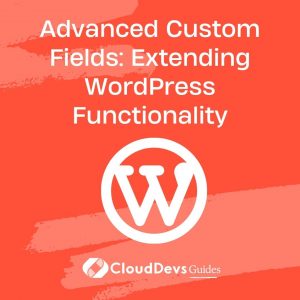Advanced Custom Fields: Extending WordPress Functionality
WordPress is an immensely popular content management system (CMS) that powers more than one-third of the internet. Its widespread adoption is attributed to its user-friendly interface, customizable themes, and extensive plugin ecosystem. One such game-changing plugin is Advanced Custom Fields (ACF), which provides a powerful way to extend WordPress functionality without the need for complex coding. In this article, we’ll delve into the world of Advanced Custom Fields, exploring its features, use cases, and how it empowers users to create dynamic and customized websites.

Table of Contents
1. Understanding Advanced Custom Fields (ACF)
At its core, WordPress is designed for managing and publishing content, but sometimes the default content types and fields might not cover the specific requirements of a website. This is where Advanced Custom Fields comes into play. ACF allows you to easily define and manage additional custom fields for your posts, pages, or custom post types. This goes beyond the traditional title and content fields, enabling you to create tailored content structures that suit your website’s needs.
2. The Power of Customization
ACF’s intuitive interface makes it accessible to users of all technical levels. With its user-friendly graphical interface, you can effortlessly add various field types to your content. These field types include text inputs, checkboxes, radio buttons, image uploaders, WYSIWYG editors, and more. This versatility empowers content creators to structure and display content in unique and engaging ways.
Code Sample 1: Creating a Basic Text Field
php
<?php
$text_field = get_field('text_field');
echo $text_field;
?>
3. Use Cases for ACF
Advanced Custom Fields is not limited to a specific type of website or industry. Its adaptability has led to its use in various scenarios, such as:
3.1. Custom Content Presentation
Whether you’re building a portfolio, a real estate website, or an e-commerce platform, ACF enables you to design custom content layouts. You can showcase different aspects of your content, such as product specifications, property details, or project timelines, by creating dedicated fields for each type of information.
3.2. Flexible Page Templates
ACF plays a crucial role in creating flexible page templates. Instead of being constrained by the default fields, you can craft page structures that align with your content’s hierarchy. This is particularly beneficial when designing intricate landing pages or showcasing diverse content on a single page.
Code Sample 2: Displaying Custom Fields in a Page Template
php
<?php
$feature_title = get_field('feature_title');
$feature_description = get_field('feature_description');
?>
<div class="feature">
<h2><?php echo $feature_title; ?></h2>
<p><?php echo $feature_description; ?></p>
</div>
3.3. Enhanced User Interaction
ACF also elevates user interaction by allowing you to create dynamic forms and personalized user experiences. You can design forms with conditional logic, where the fields displayed change based on user input, resulting in a smoother and more relevant user journey.
4. Extending ACF Functionality
While ACF offers a plethora of features out of the box, its true power lies in its extensibility. Developers can take ACF a step further by creating custom field types, extending functionalities, and integrating it with other plugins.
4.1. Creating Custom Field Types
ACF’s extensibility shines when developers build custom field types tailored to specific needs. Imagine a project management plugin that requires a “Task Progress” field. Developers can create this custom field type, complete with its appearance, behavior, and data storage, offering a seamless user experience.
4.2. Integrating ACF with Other Plugins
Integrating ACF with other plugins expands its capabilities. For example, combining ACF with an e-commerce plugin can result in a highly customized product page with fields for product specifications, customer reviews, and related products.
Code Sample 3: Integrating ACF with WooCommerce
php
<?php
$product_description = get_field('product_description');
$customer_reviews = get_field('customer_reviews');
?>
<div class="product-details">
<h2>Description</h2>
<p><?php echo $product_description; ?></p>
<h2>Customer Reviews</h2>
<ul>
<?php foreach ($customer_reviews as $review) : ?>
<li><?php echo $review; ?></li>
<?php endforeach; ?>
</ul>
</div>
4.3. Extending ACF Functionalities
Developers can also extend ACF’s functionalities by creating custom functions and filters. This opens the door to implementing complex features, such as dynamic image resizing, content synchronization, and advanced data calculations.
5. Going Beyond the Basics: ACF Extensions
To further amplify ACF’s capabilities, developers have created a wide range of extensions. These extensions are essentially add-ons that enhance ACF’s core functionality. Let’s explore a few noteworthy ones:
5.1. ACF Pro
ACF Pro is the premium version of Advanced Custom Fields. It provides additional features such as flexible content layouts, repeatable field groups, and options pages. The “Flexible Content” field type allows users to create dynamic layouts, perfect for building complex page structures.
5.2. ACF Blocks
With the advent of the WordPress block editor (Gutenberg), ACF Blocks has become increasingly relevant. It lets you create custom blocks with ACF fields, adding tremendous flexibility to the block editor. This means you can build bespoke content blocks with tailored fields and styling options.
5.3. ACF Theme Code
ACF Theme Code extension is a developer’s dream. It generates PHP code snippets based on your ACF field configurations, significantly speeding up theme development. This extension is especially handy when transitioning a locally developed site to a live environment.
Conclusion
Advanced Custom Fields (ACF) has revolutionized the way developers and content creators approach WordPress customization. With its user-friendly interface, diverse field types, and seamless extensibility, ACF empowers users to transform their WordPress websites into dynamic, personalized platforms. Whether you’re creating custom content layouts, flexible templates, or interactive forms, ACF opens the door to endless creative possibilities. As the WordPress ecosystem continues to evolve, ACF and its extensions remain essential tools for shaping the digital landscape.
Incorporating ACF into your WordPress development workflow can enhance both efficiency and creativity. Its impact extends beyond simple content management, enabling you to craft unique and engaging online experiences. So why limit yourself to the defaults? Embrace the power of Advanced Custom Fields and embark on a journey of limitless customization.
Remember, WordPress is not just a platform; it’s a canvas, and with ACF, you have the finest brushes and colors to paint your digital masterpiece.
Table of Contents








